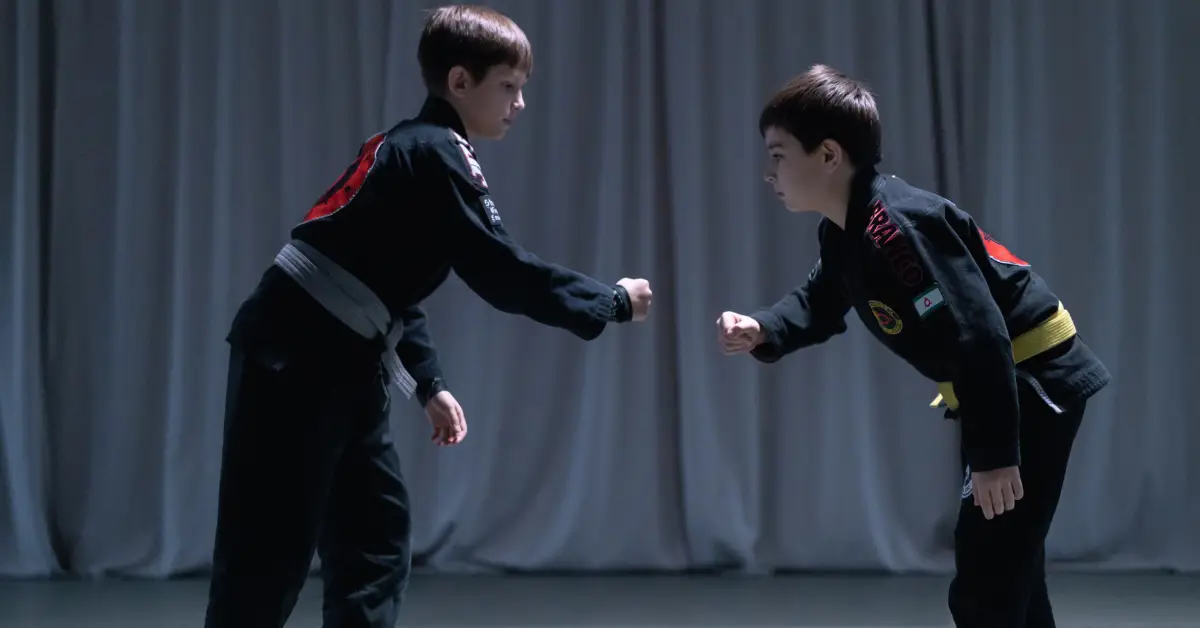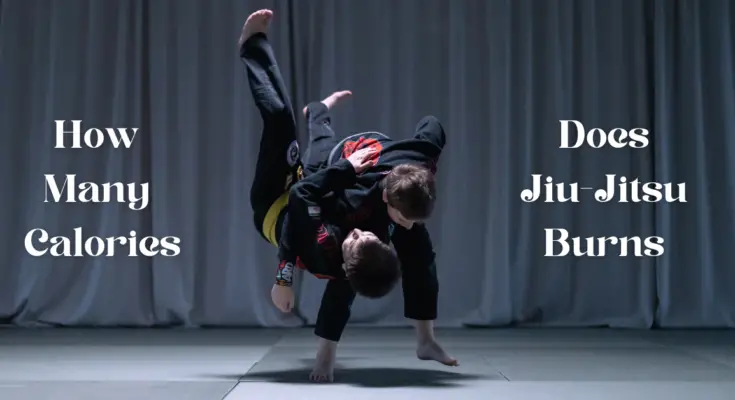Brazilian Jiu-Jitsu (BJJ) is a physically quiet, demanding martial art that can burn many calories. The amount of calories burned during a BJJ depends on various factors, such as intensity, duration, and individual body composition. How Many Calories Does Jiu Jitsu Burn?
On average, a person weighing around 155 pounds can burn approximately 500–700 calories per hour during moderate-intensity BJJ training, including warm-ups, drills, and light sparring. On the other hand, longer or more intense workouts can burn even more calories
How many calories does Jiu Jitsu burn? Role Of Nutrition
Grappling, rolling, and drilling are some exercises used in BJJ. These techniques work for several muscle groups and increase heart rate. These exercises lead to improved cardiovascular health, increased strength, enhanced flexibility, and calorie burning.
For maximum calorie burn during Jiu-Jitsu training, focus on consistent movement, proper technique, and pushing yourself during sparring sessions. Furthermore, integrating BJJ into a comprehensive fitness regimen and maintaining adequate nutrition can enhance calorie burning and overall health benefits.

Calories Burned in Jiu Jitsu
The truth is, it depends on a few factors:
- Intensity: A standard class with warm-ups, drills, and light sparring will burn differently than a high-intensity session focused on competition-style rolling.
- Your Body: Weight and muscle mass play a role. Generally, the more you weigh and the more muscle you have, the more calories you burn.
- Duration: The longer you train, the more calories you’ll incinerate.
Here’s a breakdown to get you started:
- Moderate Intensity (warm-ups, drills, light sparring): Expect to burn around 500-700 calories per hour.
- High Intensity (heavy sparring, competition rolling): You could look at 800-1000+ calories burned per hour.
That’s some serious calorie-torching! But remember, these are estimates.
Want to track your burn? Consider using a fitness tracker or app during your training. They can provide a more personalized calorie burn estimate based on your heart rate and activity level.
Brazilian Jiu-Jitsu is a tough sport that requires you to be strong, have lots of energy, and think fast. While consistent training and skill improvement are crucial, nutrition is one overlooked aspect of success in BJJ. Proper nutrition fuels your body, supports recovery, and enhances performance during training sessions.
Nutrition is super important in Brazilian Jiu-Jitsu (BJJ). Just like a car needs petrol to run smoothly, your body needs the food to perform at its best during training and competitions.
Here’s why nutrition matters in BJJ:
- Energy Boost: Eating foods with carbohydrates (like grains, fruits, and veggies) gives you the energy you need for training. Protein (found in foods like meat, eggs, and beans) helps repair and grow your muscles.
- Recovery Support: After training, your muscles need to recover. Eating a snack or meal with carbs and protein helps your body repair itself faster, so you’re ready for the next session.
- Weight Management: Some BJJ athletes need to watch their weight for competitions. Eating the right amount of calories helps them stay at the right weight while still having enough energy to train hard.
- Staying Healthy: Eating nutritious foods with lots of vitamins and minerals helps keep your body strong and less likely to get sick. That means more time on the mats and less time on the sidelines.
How many calories burned 1 hour of jiu jitsu
Jiu-Jitsu is a dynamic and engaging martial art that offers a rigorous workout. If you’re wondering how many calories you can burn in just one hour of Jiu-Jitsu, the answer can vary based on several factors.
Here’s a general estimate of calorie burn for different levels of Jiu-Jitsu training:
- Light Training (drills, light sparring): 500-700 calories per hour
- Moderate Training (intense drilling, moderate sparring): 700-900 calories per hour
- Intense Training (vigorous sparring, competition training): 900-1,000+ calories per hour
Calories In vs Calories Out in jiu-jitsu
“Calories In vs. Calories Out in Jiu-Jitsu: Understanding Energy Balance for Performance and Weight Management”
1. Calories in:
Several calories are consumed through food and beverages. In jiu-jitsu, athletes must consume enough calories to fuel their training sessions, support muscle repair and growth, and maintain overall health. The quality of the calories consumed is also important, emphasizing nutrient-dense foods that provide essential vitamins, minerals, and macronutrients.
2. Calories Out:
This represents the number of calories expended through physical activity, including jiu-jitsu training sessions and other forms of exercise. The intensity and duration of training sessions and an individual’s body weight and composition can influence the number of calories burned during jiu-jitsu practice. Metabolism and non-exercise activity thermogenesis (NEAT) also contribute to energy expenditure.
Benefits of Jiu-Jitsu in Calorie Burning
Jiu-Jitsu is a martial art that offers a wealth of physical and mental benefits. One of the most compelling reasons to practice Jiu-Jitsu is its effectiveness in burning calories. If you’re looking to understand how Jiu-Jitsu can aid in your weight loss and fitness journey, here’s a detailed look at the benefits of Jiu-Jitsu in calorie burning.
High-Calorie Burn
Jiu-Jitsu is a full-body workout that engages multiple muscle groups simultaneously. Here’s how it helps burn a significant number of calories:
- Intense Physical Activity: Jiu-Jitsu involves constant movement, whether you’re drilling techniques, sparring, or rolling. This continuous activity elevates your heart rate, leading to a higher calorie burn.
- Engages Multiple Muscle Groups: The grappling and ground fighting techniques in Jiu-Jitsu work various parts of your body, including your core, legs, arms, and back. Engaging these muscle groups requires more energy, thus burning more calories.
- Varied Intensity Levels: Jiu-Jitsu sessions can range from moderate to high intensity. Higher-intensity sessions, such as competitive sparring, can burn between 900 to 1,000 calories per hour.
Boosts Metabolism
Regular practice of Jiu-Jitsu can lead to a higher resting metabolic rate. Here’s how:
- Increases Muscle Mass: As you train, you build muscle mass. Muscles burn more calories at rest compared to fat, thus increasing your basal metabolic rate.
- Afterburn Effect: High-intensity Jiu-Jitsu sessions can lead to the afterburn effect, also known as excess post-exercise oxygen consumption (EPOC). This means you continue to burn calories after your training session ends.
Combines Cardio and Strength Training
Jiu-Jitsu is unique because it combines cardiovascular exercise with strength training:
- Cardiovascular Benefits: The dynamic movements and constant transitions in Jiu-Jitsu improve cardiovascular health, enhancing endurance and stamina.
- Strength Training: Techniques such as submissions and escapes require strength and leverage, which build muscle and improve overall body strength.
Enhances Flexibility and Coordination
Improved flexibility and coordination are additional benefits that contribute to calorie burning:
- Flexibility: The various positions and techniques in Jiu-Jitsu improve your flexibility, making it easier to perform movements that engage different muscle groups.
- Coordination: Improved coordination allows for more efficient movements, making your workouts more effective and increasing calorie expenditure.
Mental Benefits
Jiu-Jitsu also provides mental benefits that indirectly support calorie burning:
- Stress Relief: Physical activity like Jiu-Jitsu helps reduce stress, which can prevent stress-related eating and weight gain.
- Improved Focus and Discipline: Training in Jiu-Jitsu requires mental focus and discipline, helping you stay committed to your fitness and weight loss goals.
To Sum Up With
How many calories does Jiu-Jitsu burn? The answer varies depending on intensity, duration, and individual body composition. An average person weighing around 155 pounds can burn between 500 and 700 calories per hour during moderate-intensity BJJ training. More intense sessions can see calorie burns reaching 900 to 1,000 calories per hour.
Jiu-Jitsu provides a high-calorie burn and offers numerous physical and mental benefits, such as improved cardiovascular health, increased strength and flexibility, and enhanced mental focus. Combining consistent training with proper nutrition can maximize these benefits, making Jiu-Jitsu a powerful tool for weight management and overall fitness.
For anyone passionate about their fitness journey and wondering how many calories Jiu-Jitsu burns, incorporating this martial art into your routine can yield impressive results. Track your progress with fitness trackers to get a personalized estimate of your calorie expenditure and stay dedicated to better health.
You may also like to read: How Many Calories Does Paddle Boarding Burn?
Does a Driving Burn Calories? l You Absolutely Need To Know This




